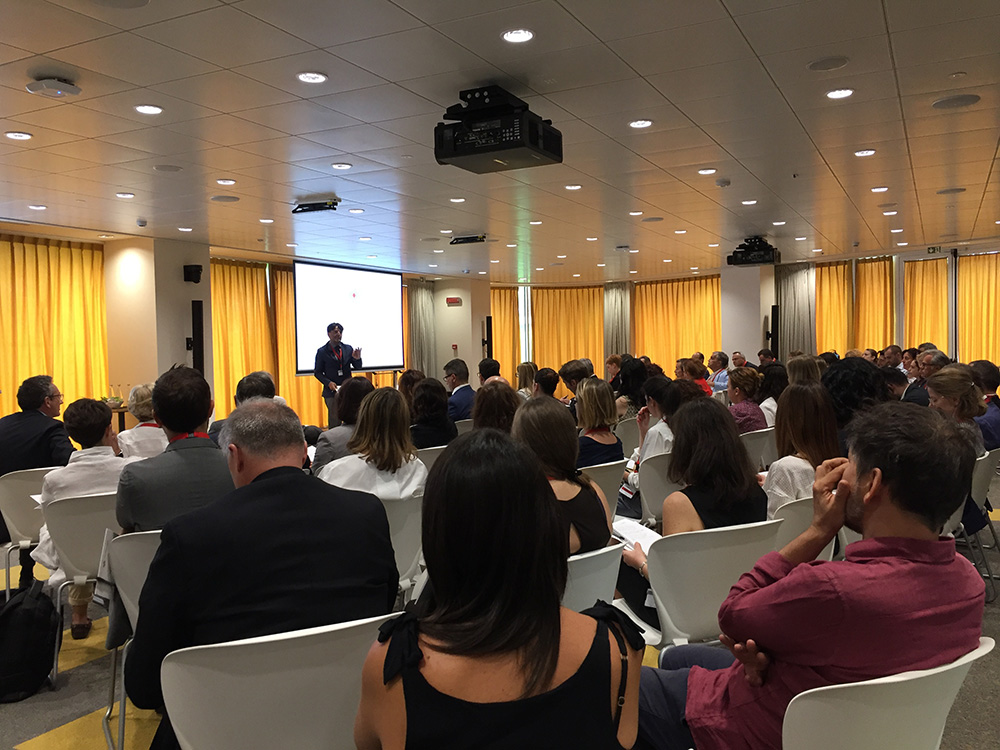 At the “Brand Engagement” meeting organized by Centromarca* in collaboration with Whirlpool EMEA’s HQ in Milan on 12 July 2017, we had the chance to host an audience of Communication, Marketing, Human Resources and Sales managers and to debate with them some key industry trends.
At the “Brand Engagement” meeting organized by Centromarca* in collaboration with Whirlpool EMEA’s HQ in Milan on 12 July 2017, we had the chance to host an audience of Communication, Marketing, Human Resources and Sales managers and to debate with them some key industry trends.
Change is a constant in the brand industry. It’s the key factor in competitiveness: if you don’t evolve, if you’re not an active exponent of the contemporary, you’re condemned to obsolescence, to being ignored by consumers.
Let’s take the case of “quality”. This isn’t a static concept, it evolves over time in response to the services that consumers demand, but also to society’s needs in a wider sense. It’s a dynamic value and the company that’s best at generating and tailoring it for its stakeholders will beat the competition.
The key to success is always listening, analyzing and coming up with answers, which may be in the form of products and services but also significant changes in ways of doing business and relating to society.
Think of a domestic washing machine. It’s obviously got to wash clothes much better than a Sixties model and have an in-trend design, but it must also use less water, less detergent and less energy, because these characteristics help position the product with respect to the social context and our need to safeguard the environment and preserve raw materials.
Brand engagement, whereby a brand engages its various publics, now means vigorously embracing the dimension of change. On one hand this involves looking inwards to understand whether our brand has contemporary values, while on the other, if we do have those values and they’re valid, it’s indispensable to present them appropriately in our relations with stakeholders, the aim being to achieve engagement, harmony and empathy to a greater extent than our competitors.
These concepts are clear on paper but often problematic in practice. Employing them means giving real significance to buzz words. And this means sharing information, inter-functional analysis, the overcoming of hierarchical boundaries to make room for ideas, abandoning the principles of “it’s always been done this way”, and opening up to inter-generational and intercultural discussion.
In our work we ought to be asking ourselves pretty often whether we’re going in this direction. Are we really creating the conditions for making our brand a value-driven instrument of engagement within and outside our organization, over and above our human resources initiatives and marketing and communication strategies? Are we honestly looking inside ourselves to find inconsistencies? Are we learning from experience in order to trigger processes of structural improvement?
Companies seem to be concentrating on two main fronts: transformation/digitalization and efficiency boosting/optimization. The two activities are closely linked (given the all-pervasiveness of digital applications) and have created a pressing need for companies to find skilled resources and instruments (the study pointed in particular to a certain lack of integrated data management tools, which are indispensable for effective and efficient sharing of information).
Sustainability is the theme around which companies have developed the most effective synergies (and highest levels of direct employee engagement), followed by product innovation and brand positioning.
Sharing analysis of the results and launching of pilot projects are two of the methods that many companies said were likely to favour synergy between functions.
Penetration of digital platforms in businesses is particularly high. Social media are used by 82% of the sample, company portals by 77% and intranet portals by 68%. Despite these figures, it should be noted that businesses are somewhat sceptical about the role that social media can play in determining consumers’ choices. Such doubts probably reflect the still uncertain definition of the role of the socials in business strategies, which is also borne out by the reduced social media ability of consumer goods industries (noted in various studies, including an analysis by IULM University of Milan.
These are important factors to consider when developing activities to augment a brand’s engagement power, not only for strictly commercial purposes (by communicating distinctive values with respect to the competition) but on a deeper level (and on a longer time scale) to consolidate a company’s reputational assets upstream of the product.
In many cases, success is associated with a strong cultural transformation, which all enterprises must bring about in ways appropriate to their history, values and objectives.
An exclusive commentary by Ivo Ferrario, Centromarca Director for Communications and External Relations.
* Centromarca associates about 200 companies among the leaders in the FMCG and durable goods industries (food and beverage, chemicals, textile, electric, bricolage, games and home entertainment)